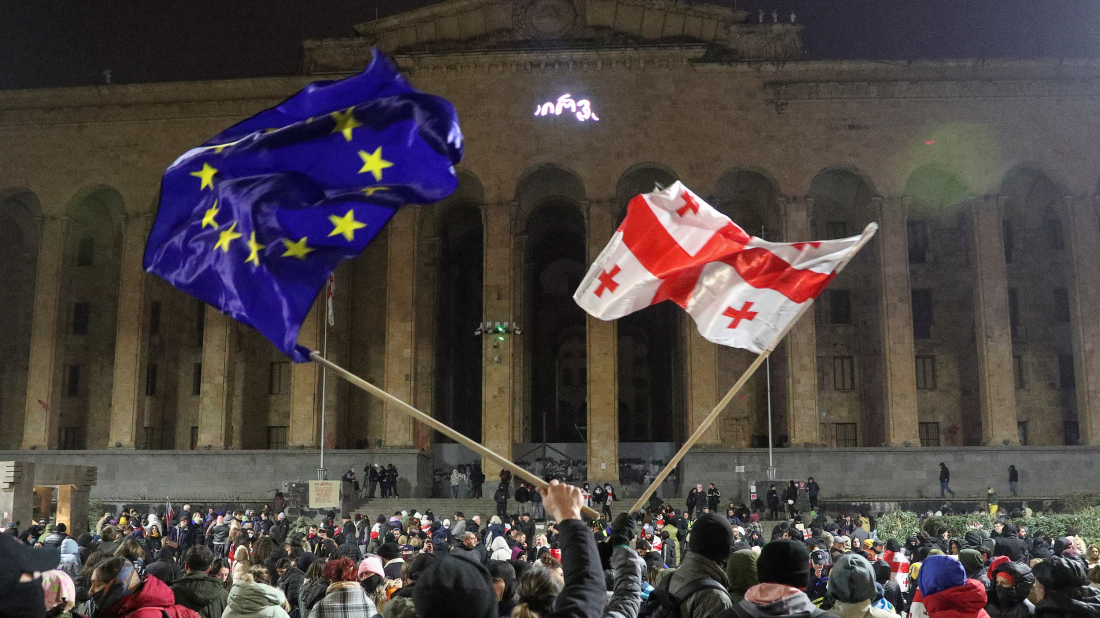Two killed in Israeli attack on first day of Ramadan in Gaza
Two Palestinians were killed on the first day of Ramadan after Israeli forces opened fire in the Gaza Strip, according to local sources and hospital o...

Georgians have gathered outside the parliament building, for over three hundred days, blocking the road on Rustaveli Avenue without pause over its country's deviation from the path to EU membership.
The sustained protest which is now one of the longest in the country’s history, began after Prime Minister Irakli Kobakhidze announced that Georgia would suspend EU membership talks until 2028, a move that shocked many citizens and strained already fragile ties with Western partners.
What started as outrage over that announcement has grown into a broader movement demanding transparency, accountability, and a return to Georgia’s European path.
The initial ire which was triggered by the government’s retreat from EU integration, quickly snowballed into a campaign against the government.
The protesters decried police brutality and detentions, growing restrictions on civil society and a perceived back pedaling from Democracy.
Rights groups document excessive force, beatings, and mistreatment in custody by law enforcement during rallies, with laws modeled after Russia’s “foreign agents” framework being viewed as attempts to stigmatize NGOs and independent media.
Protesters accuse the ruling party, Georgian Dream, of undermining institutions, silencing critics, and manipulating laws to consolidate power.
The government frames its actions as necessary to defend sovereignty and national interests. Officials argue that Western partners have interfered too directly in Georgian politics and that the suspension of EU talks is meant to “reset” relations on Georgia’s own terms.
On civil society restrictions, Georgian Dream insists transparency is needed to curb “foreign influence.” But opponents see this as a clear sign of tightening control.
Security forces defend their handling of protests, saying they are maintaining order.
Meanwhile, virtually all major opposition leaders are now in detention, a move critics describe as an effort to decapitate the movement.
The next major flashpoint is expected on October 4, the day of Georgia’s local elections. Protesters are planning a mass demonstration they call a “peaceful revolution.” Organizers say it will be the largest mobilization yet, meant to challenge both the legitimacy of the elections and the broader course set by the government.
With opposition leaders behind bars and tensions high, the day could mark a decisive turning point — either intensifying the confrontation or forcing dialogue about the country’s future.
The three hundred days of protest is a test of endurance for the Georgian government, gauging how far it can contain dissent, push forward with its legislative agenda, and maintain legitimacy amid growing international pressure. The outcome could shape its democratic path for years to come.
Cuba’s fuel crisis has turned into a waste crisis, with rubbish piling up on most street corners in Havana as many collection trucks lack enough petrol to operate.
Ruben Vardanyan has been sentenced to 20 years in prison by the Baku Military Court after being found guilty of a series of offences including war crimes, terrorism and crimes against humanity.
Canadian Prime Minister, Mark Carney, announced on 16 February that the Honourable Janice Charette has been appointed as the next Chief Trade Negotiator to the United States. She's been tasked with overseeing the upcoming review of the Canada-United States-Mexico Agreement (CUSMA).
The Pentagon has threatened to designate artificial intelligence firm Anthropic as a “supply chain risk” amid a dispute over the military use of its Claude AI model, according to a report published Monday.
Israeli airstrikes on southern Lebanon killed two people in 12 hours, Lebanon’s Health Ministry said on Tuesday.
Two Palestinians were killed on the first day of Ramadan after Israeli forces opened fire in the Gaza Strip, according to local sources and hospital officials.
British Steel has secured a multi-million-pound order to supply rail for a major high-speed railway in Türkiye. Backed by UK Export Finance, the deal will see 36,000 tonnes of rail used on a 599km line between Ankara and İzmir, prompting the company to resume round-the-clock production.
A new freight corridor linking China with Tajikistan via Kyrgyzstan and Uzbekistan has entered pilot operation, marking another step in Central Asia’s expanding transport connectivity.
Afghan and Uzbek traders have signed 25 agreements worth more than $300 million at a business conference, as officials from both sides said trade ties are expanding rapidly and could grow further in the coming years.
Turkish Foreign Minister Hakan Fidan will attend the inaugural meeting of U.S. President Donald Trump’s “Board of Peace” in Washington on Thursday, representing President Recep Tayyip Erdoğan, Türkiye’s Foreign Ministry has said.
You can download the AnewZ application from Play Store and the App Store.

What is your opinion on this topic?
Leave the first comment